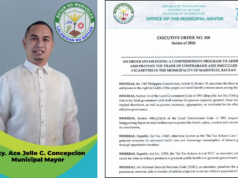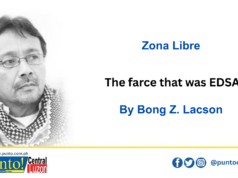I started working as a full-time coach on June 1, 1999 with a part time monthly salary of P650. That’s how desperate I was 11 years ago.
Like writing, being a sportsperson is all hardwork and passion.
For 10 long years, I taught my players the basics of table tennis: First, the proper way of holding a racket, preferring a shakehand grip than the penhold often adopted by most Chinese, Koreans and Japanese.
Second, I forced my players to run every morning. Then do footwork exercises and shadowing follows. I also taught them how to accept defeat because that is the essence of true sportsmanship.
As they constantly raise the level of their skills, the more they fall in love with the game, just the way I fell in love with journalism. It is true that good players don’t need to be reminded about discipline, about what they need to do. On the other hand, good journalists don’t need to be reminded about ethics.
During actual competitions, I remember saying this line to them: “Kahit matalo tayo ok lang, basta ang gusto ko ay gawin ninyo kung ano ang pinraktis natin. (even if we lose, it’s okay, what I want is you do the things that we practiced).”
When I attended journalism seminars, I remember Mr. Vergel Santos saying: “When you write, don’t think of what’s going to be the impact of what you are going to write.”
When my player faces a deadlock during end games, I have to call a time-out and talk to them. When a writer is faced with a libel, he has to call his editor and lawyer.
Experienced players developed what they call “gulang”, the unorthodox, unusual, and out of the box moves used during nerve-wracking games. Experienced and prolific writers developed what they call the sixth sense or the “nose for news”.
In sports especially in table tennis, you need to hit a million balls before you win a tournament. In journalism, you have to read thousands of books before you become a prolific writer and editor.
After a year of training, discipline and hardwork, our prayers were answered. No, we didn’t win any competition. None of us, including my players, became members of the Philippine team. We never had the chance to represent the country in any international competition just like the Southeast Asian games. We simply realized we just have to enjoy the game we play.
The years to follow were fruitful. We won seven consecutive championships (2003-2009) in the National Athletic Association of Schools, Colleges and Universities (NAASCU). But the most important championship we won was not about defeating some of the best players from prestigious schools in Manila. It was about brotherhood. It was about caring and helping each other to strive not only in the game, but in life: poverty, unemployment, early marriage, family conflicts, and etc.
When I was a neophyte writer, I thought that writing for a newspaper was like writing love letters. I started from zero.
“There is only one thing I want you to remember…” the late Ody Fabian told me. “Don’t plagiarize because I hate plagiarism,” he said.
From there, Sir Ody would often send me to journalism seminars and workshops (organized by the Philippine Press Institute) in Manila and in Subic. Then later after our mentor’s death on February 20, 2004, I was asked by Dino Balabo to write for The Manila Times and for other local newspapers in Pampanga. Then came Punto Central Luzon where I now work as an editor.
Reminiscing the good old table tennis days, I would always compare sports with journalism: the gym where we practice as the newsroom; the team as the editorial department, the coach as the editor, the players as the reporters and correspondents, and the racket as the pen (but now netbooks and laptops); Accuracy is when you create a powerful forehand or backhand topspin and scores a point, just like double checking and validating your facts before writing a good story. Balanced is when you have a strong forehand as well as a strong backhand, just like having the necessary knowledge and skills, having the persistency and the diligence needed to become a successful journalist. Context is when you understand the theories of the game and follow all the instructions of your coach, just like attacking an issue and putting it in the proper perspective, thus, producing an interesting and well written story.
But the story doesn’t end there. Some things simply don’t last a lifetime. On November 3, 2008, I gave up coaching since I have to focus on a job similar to it, a job that motivates me to learn more and look beyond the surface; a job that helps people understand what the news means to them; a job that is decent, noble and fair; and a job where passion becomes unkillable whatever happens.
Like writing, being a sportsperson is all hardwork and passion.
For 10 long years, I taught my players the basics of table tennis: First, the proper way of holding a racket, preferring a shakehand grip than the penhold often adopted by most Chinese, Koreans and Japanese.
Second, I forced my players to run every morning. Then do footwork exercises and shadowing follows. I also taught them how to accept defeat because that is the essence of true sportsmanship.
As they constantly raise the level of their skills, the more they fall in love with the game, just the way I fell in love with journalism. It is true that good players don’t need to be reminded about discipline, about what they need to do. On the other hand, good journalists don’t need to be reminded about ethics.
During actual competitions, I remember saying this line to them: “Kahit matalo tayo ok lang, basta ang gusto ko ay gawin ninyo kung ano ang pinraktis natin. (even if we lose, it’s okay, what I want is you do the things that we practiced).”
When I attended journalism seminars, I remember Mr. Vergel Santos saying: “When you write, don’t think of what’s going to be the impact of what you are going to write.”
When my player faces a deadlock during end games, I have to call a time-out and talk to them. When a writer is faced with a libel, he has to call his editor and lawyer.
Experienced players developed what they call “gulang”, the unorthodox, unusual, and out of the box moves used during nerve-wracking games. Experienced and prolific writers developed what they call the sixth sense or the “nose for news”.
In sports especially in table tennis, you need to hit a million balls before you win a tournament. In journalism, you have to read thousands of books before you become a prolific writer and editor.
After a year of training, discipline and hardwork, our prayers were answered. No, we didn’t win any competition. None of us, including my players, became members of the Philippine team. We never had the chance to represent the country in any international competition just like the Southeast Asian games. We simply realized we just have to enjoy the game we play.
The years to follow were fruitful. We won seven consecutive championships (2003-2009) in the National Athletic Association of Schools, Colleges and Universities (NAASCU). But the most important championship we won was not about defeating some of the best players from prestigious schools in Manila. It was about brotherhood. It was about caring and helping each other to strive not only in the game, but in life: poverty, unemployment, early marriage, family conflicts, and etc.
When I was a neophyte writer, I thought that writing for a newspaper was like writing love letters. I started from zero.
“There is only one thing I want you to remember…” the late Ody Fabian told me. “Don’t plagiarize because I hate plagiarism,” he said.
From there, Sir Ody would often send me to journalism seminars and workshops (organized by the Philippine Press Institute) in Manila and in Subic. Then later after our mentor’s death on February 20, 2004, I was asked by Dino Balabo to write for The Manila Times and for other local newspapers in Pampanga. Then came Punto Central Luzon where I now work as an editor.
Reminiscing the good old table tennis days, I would always compare sports with journalism: the gym where we practice as the newsroom; the team as the editorial department, the coach as the editor, the players as the reporters and correspondents, and the racket as the pen (but now netbooks and laptops); Accuracy is when you create a powerful forehand or backhand topspin and scores a point, just like double checking and validating your facts before writing a good story. Balanced is when you have a strong forehand as well as a strong backhand, just like having the necessary knowledge and skills, having the persistency and the diligence needed to become a successful journalist. Context is when you understand the theories of the game and follow all the instructions of your coach, just like attacking an issue and putting it in the proper perspective, thus, producing an interesting and well written story.
But the story doesn’t end there. Some things simply don’t last a lifetime. On November 3, 2008, I gave up coaching since I have to focus on a job similar to it, a job that motivates me to learn more and look beyond the surface; a job that helps people understand what the news means to them; a job that is decent, noble and fair; and a job where passion becomes unkillable whatever happens.




